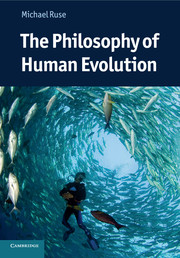5 - Knowledge
Published online by Cambridge University Press: 05 June 2012
Summary
Charles Darwin was a scientist, not a philosopher. However, he was a well-educated Englishman from the first half of the nineteenth century and as such had a good grasp of the history of philosophy, something reinforced by family connections and friends, especially the London-based set in which his elder brother (another Erasmus Darwin) moved. He had things to say both about epistemology (the theory of knowledge) and ethics (the theory of morality). The former topic is the subject of this chapter and the latter of the next chapter. In both cases we begin with Darwin, but the aim is to move to the present and to ask about the importance of Darwinian evolutionary theory (as conceived today) to contemporary philosophical thinking. I should say that were I writing this book some seventy or eighty years ago, the treatment would be brief and critical. The highly influential, Austrian-born, England-residing philosopher Ludwig Wittgenstein spoke for many when he said, somewhat contemptuously: “Darwin’s theory has no more relevance for philosophy than any other theory in natural science” (Wittgenstein 1923, 4.1122). General opinion was that, if anything, bringing Darwin to bear on these issues was not just wrong, but somehow intellectually unclean. A bit like a bad smell at a vicarage garden party. People who got into this business probably had some unspoken agenda, either of a mystical or more dangerous political nature. One confesses that there was some justification for this attitude. But while it is important to understand the past, we do not necessarily have to be its prisoners. Today there is a huge amount of interest in the relevance of evolutionary thinking to philosophical issues, and even the skeptics agree that the interaction is beneficial. Let us see why. (A recent reader, Ruse 2009b, contains much material pertinent to this and the next chapter.)
- Type
- Chapter
- Information
- The Philosophy of Human Evolution , pp. 128 - 154Publisher: Cambridge University PressPrint publication year: 2012

